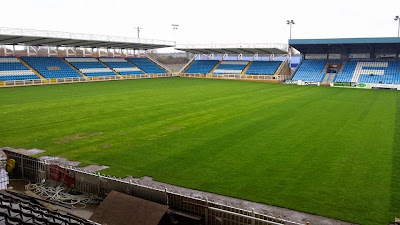What a remarkable cradle of rugby league talent the village of Sharlston has been over the years. Rovers of course have benefited as much as anyone with such as Don Fox and Carl Dooler doing us proud. Legend has it that Joe Mullaney’s first time out of Sharlston was to play for Rovers in a trial match. Of course local players have travelled much further afield than that to play rugby league, but none of the famous sons of Sharlston probably went quite as far for his club rugby as Ivor Lingard.
 |
| Sharlston's finest in Parramatta |
Signed by Rovers from Sharlston in early 1961, Ivor was faced with the same tough task as a number of talented half backs at Post Office Road in the early 1960s. How to break into a Rovers team where Don Fox and Joe Mullaney had a mortgage on the six and seven jerseys for years. After four seasons of trying, with some success, Ivor took the unprecedented step of emigrating to Australia. He signed for Parramatta Eels in the NSW premiership where he spent the rest of his career. In many ways Ivor was ahead of his time as it became very trendy during the 1970s for Aussie clubs to import British talent, with such as Mal Reilly, Tommy Bishop and Mick “Stevo” Stephenson heading out to Sydney. During his six years in the first team, Ivor was a model of consistency, appearing in 90 games for Parramatta, scoring 20tries, one goal and eight drop goals. He appeared mostly at stand-off, but could fill in various back positions when necessary. He was noted in the 1964 NSW Yearbook for his perfect execution of the “Cumberland Throw” tackle, common enough in England, but quite unusual for Australians, the art of using the leg to simultaneously trip and wrestle a bigger opponent to the floor. In 1970 he was an ever present in the first team, playing all 22 games, but by 1972 had retired and started to coach the junior teams at Parramatta. He got as far as head coach for the U23s side in 1975.
Following Lingard’s trail blazing, Vince Farrah headed out to Cronulla in 1974 but stayed only that summer. Despite persistent rumours to the contrary Steve Nash never left Featherstone for Australia, choosing Salford instead. Less sunshine, but still. Another former Rovers favourite Terry Clawson turned up at South Newcastle in 1975, from where indeed Rovers re-signed him in 1978.
An international transfer ban ended this flow of talent, and when it was lifted the traffic was very much in the opposite direction as the British market was flooded with Aussies and few of our stars looked good enough to the ARL clubs. Deryck Fox had a successful summer with Western Suburbs in 1986. That club made a speciality of short term success with English stars, Garry Schofield, Des Drummond and Ellery Hanley among them. Deryck made his mark too, and the esteemed Aussie newspaper Rugby League Week compared his style to the great Tom Raudonikis, some compliment.
In the summer of 1989 Graham Steadman was going through a sticky transfer from Rovers to somewhere else, and took the heat off with a very modest summer spell at the Gold Coast Seagulls whilst still a Rovers’ player. That year a long striding English centre took Balmain by storm helping them all the way to the Grand Final. It would have been this kind of amazing form which persuaded Rovers to pay what they did a few years later for Andy Currier. If you ever get the chance to see the 1989 grand final between Canberra and Balmain, look out for Andy’s “unique” tackling style as Canberra race in for the match winning try. Fair play though, he seemed to have a far more positive impact there than his unfortunate stay with us. Also Gary Price left Featherstone for South Sydney to play ARL at the height of the Super League war in 1995. He came back home in 1998.
Following Lingard’s trail blazing, Vince Farrah headed out to Cronulla in 1974 but stayed only that summer. Despite persistent rumours to the contrary Steve Nash never left Featherstone for Australia, choosing Salford instead. Less sunshine, but still. Another former Rovers favourite Terry Clawson turned up at South Newcastle in 1975, from where indeed Rovers re-signed him in 1978.
An international transfer ban ended this flow of talent, and when it was lifted the traffic was very much in the opposite direction as the British market was flooded with Aussies and few of our stars looked good enough to the ARL clubs. Deryck Fox had a successful summer with Western Suburbs in 1986. That club made a speciality of short term success with English stars, Garry Schofield, Des Drummond and Ellery Hanley among them. Deryck made his mark too, and the esteemed Aussie newspaper Rugby League Week compared his style to the great Tom Raudonikis, some compliment.
In the summer of 1989 Graham Steadman was going through a sticky transfer from Rovers to somewhere else, and took the heat off with a very modest summer spell at the Gold Coast Seagulls whilst still a Rovers’ player. That year a long striding English centre took Balmain by storm helping them all the way to the Grand Final. It would have been this kind of amazing form which persuaded Rovers to pay what they did a few years later for Andy Currier. If you ever get the chance to see the 1989 grand final between Canberra and Balmain, look out for Andy’s “unique” tackling style as Canberra race in for the match winning try. Fair play though, he seemed to have a far more positive impact there than his unfortunate stay with us. Also Gary Price left Featherstone for South Sydney to play ARL at the height of the Super League war in 1995. He came back home in 1998.

No comments:
Post a Comment